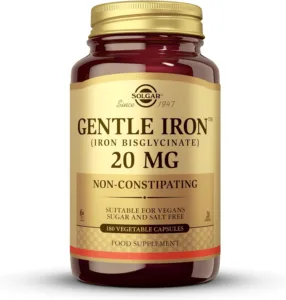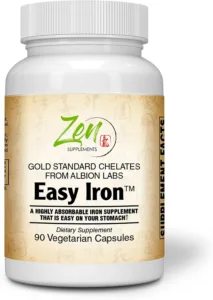
Iron supplements can be incredibly beneficial for individuals with sensitive stomachs who struggle to obtain sufficient iron through diet alone. However, choosing the right iron supplement can be a daunting task with a plethora of options available on the market. In this article, we will explore the various aspects of iron supplements, discuss the connection between iron supplements and stomach sensitivity, offer guidance on selecting the best iron supplement for sensitive stomachs, provide tips on minimizing stomach discomfort while taking iron supplements, and address frequently asked questions on this topic.[1][2][3]
Top 3 Best Iron Supplements for Sensitive Stomachs
- Solgar Gentle Iron. Boost your vitality with our supplement that promotes normal red blood cell production and supports efficient energy utilization. Crafted to be non-constipating and gentle on the stomach, this formula is suitable for vegetarians.
- Zen Supplements – Easy Iron. Revitalize your iron levels with our highly potent supplement designed for maximum bioavailability and absorption. Our chelated iron formula ensures increased effectiveness while minimizing the risk of nausea, upset stomach, and constipation—common side effects associated with traditional iron supplements.
- GNC Gentlesorb Iron. Discover the power of GNC Gentlesorb Iron 18 mg—a clinically proven, highly absorbable solution that supports healthy red blood cell formation. Unlike traditional iron supplements, our formula closely mimics the iron found in natural, organic sources, ensuring gentleness on the stomach without compromising effectiveness. With no sugar, starch, artificial colors, flavors, or gluten, it’s the perfect choice for those seeking a clean and potent iron boost.
Understanding Iron Supplements
Iron is an essential mineral that plays a vital role in our body’s overall health and function. It is responsible for oxygen transport, energy production, and DNA synthesis. While iron can be obtained through diet, some individuals may have difficulty absorbing enough iron or may have increased iron requirements due to certain health conditions.
The Role of Iron in the Body
Iron is a key component of hemoglobin, the molecule that carries oxygen from the lungs to the rest of the body. It also helps in the formation of myoglobin, a protein that stores oxygen in muscle cells. Iron is essential for optimal brain function, immune system support, and the production of red blood cells.
In addition to its role in oxygen transport and energy production, iron is also involved in various enzymatic reactions within the body. It acts as a cofactor for enzymes involved in the synthesis of neurotransmitters, such as serotonin and dopamine, which play a crucial role in mood regulation. Iron is also necessary for the production of collagen, a protein that provides structure and strength to connective tissues, including skin, bones, and blood vessels.
Furthermore, iron plays a critical role in the immune system. It is involved in the production and maturation of immune cells, such as lymphocytes and macrophages, which help defend the body against infections and diseases. Iron deficiency can impair immune function, making individuals more susceptible to infections and compromising their ability to fight off pathogens.
Why Some People Need Iron Supplements
Iron deficiency is a common nutritional deficiency worldwide, and certain individuals are more prone to it. Pregnant women, women with heavy menstrual bleeding, children, vegetarians, and individuals with certain medical conditions such as celiac disease or gastrointestinal disorders may require additional iron supplementation to meet their daily needs.
Pregnant women have increased iron requirements to support the growth and development of the fetus and to prevent maternal anemia. Iron supplementation during pregnancy is crucial to ensure adequate iron stores for both the mother and the baby. Women with heavy menstrual bleeding may experience significant blood loss, leading to iron deficiency over time. Iron supplements can help replenish the lost iron and prevent the development of anemia.
Children, especially during periods of rapid growth, require sufficient iron for proper cognitive development and to support the production of red blood cells. Iron deficiency in children can lead to impaired learning abilities and decreased physical performance. Vegetarians, particularly those who do not consume iron-rich plant-based foods in adequate amounts, may be at a higher risk of iron deficiency. Iron supplements can help bridge the gap and ensure they meet their iron needs.
Individuals with celiac disease or gastrointestinal disorders, such as inflammatory bowel disease or gastric bypass surgery, may have impaired iron absorption due to damage to the intestinal lining or reduced stomach acid production. Iron supplements can help compensate for the malabsorption and prevent iron deficiency in these individuals.
How Iron Supplement Acts in the Body
Iron is a crucial mineral that plays multiple roles in the body, including oxygen transport, energy production, brain function, immune system support, and red blood cell production. While iron can be obtained through diet, some individuals may require additional iron supplementation to meet their daily needs. Pregnant women, women with heavy menstrual bleeding, children, vegetarians, and individuals with certain medical conditions are among those who may benefit from iron supplements. It is important to consult with a healthcare professional before starting any supplementation to determine the appropriate dosage and duration.
The Connection Between Iron Supplements and Stomach Sensitivity
While iron supplements can provide numerous benefits, some individuals may experience stomach discomfort or other gastrointestinal side effects when taking them. It’s essential to understand the potential reasons behind this connection and explore strategies to minimize these symptoms for those with sensitive stomachs.
Iron supplements are commonly used to treat iron deficiency anemia, a condition characterized by low levels of iron in the body. However, despite their efficacy, these supplements can sometimes lead to unwanted side effects.
Common Side Effects of Iron Supplements
Iron supplements can cause side effects such as nausea, constipation, diarrhea, stomach cramps, and abdominal pain. These side effects can be particularly challenging for individuals with sensitive stomachs or pre-existing digestive issues.
Nausea is one of the most common side effects reported by individuals taking iron supplements. This feeling of queasiness can range from mild discomfort to severe bouts of vomiting. It is believed to occur due to the irritation of the stomach lining caused by the iron compounds present in the supplements.
Constipation is another prevalent side effect associated with iron supplementation. Iron can slow down the movement of the digestive tract, leading to difficulty in passing stool. This can cause discomfort and bloating, further exacerbating stomach sensitivity.
On the other hand, some individuals may experience the opposite effect and develop diarrhea after taking iron supplements. This can occur due to the irritation of the intestinal lining, leading to increased fluid secretion and rapid bowel movements.
Stomach cramps and abdominal pain are also commonly reported side effects. These symptoms can range from mild discomfort to severe pain, making it difficult for individuals to carry out their daily activities comfortably.
Why Iron Supplements Can Upset Your Stomach
The main reason iron supplements can cause stomach discomfort is due to their potential to irritate the gastrointestinal lining. Iron is not readily absorbed in its elemental form, and certain compounds used in iron supplements, such as ferrous sulfate, can be harsh on the stomach lining, leading to irritation and subsequent discomfort.
In addition to the irritation caused by the iron compounds, the high doses of iron present in supplements can also contribute to stomach sensitivity. The body has a limited capacity to absorb iron, and excess amounts can accumulate in the gastrointestinal tract, causing irritation and digestive disturbances.
Furthermore, the timing and method of taking iron supplements can also play a role in stomach sensitivity. Taking iron on an empty stomach can increase the likelihood of experiencing side effects, as the concentrated iron can directly come into contact with the stomach lining. However, taking iron with food can help reduce the irritation by diluting the concentration and providing a protective barrier.
It’s important to note that individual tolerance to iron supplements can vary. While some individuals may experience minimal side effects, others may be more prone to stomach sensitivity. Consulting with a healthcare professional can help determine the appropriate dosage and form of iron supplementation for those with sensitive stomachs.[8][9][10]
Choosing the Right Iron Supplement for Sensitive Stomachs
When it comes to selecting an iron supplement for individuals with sensitive stomachs, there are several factors to consider. These factors are crucial in ensuring optimal tolerability and absorption of the iron supplement. Let’s take a closer look at these key factors:
Key Factors to Consider
- Formulation. One of the most important factors to consider is the formulation of the iron supplement. Look for supplements that are specifically designed for enhanced absorption and minimal stomach irritation. Certain formulations, such as iron bisglycinate, are known for their gentle effects on the stomach. These formulations can help reduce the risk of digestive upset and discomfort.
- Dosage. Determining the appropriate dosage of iron supplement is essential. It is important to consider your individual needs and consult with your healthcare provider. To avoid excessive intake and potential side effects. Your healthcare provider can help you determine the right dosage based on factors. Such as your age, gender, and overall health.
- Additional Ingredients. Some iron supplements are combined with other nutrients. Such as vitamin C or probiotics. These additional ingredients can improve iron absorption and help alleviate stomach discomfort. For example, vitamin C is known to enhance iron absorption. Probiotics can promote a healthy gut environment and reduce the risk of digestive issues.
- Quality and Safety. When choosing an iron supplement, it is important to opt for products from reputable brands. Look for supplements that undergo rigorous testing for quality and safety. This ensures that you are consuming a reliable and trustworthy product.
How to Take Iron Supplements for Minimal Stomach Discomfort
If you have a sensitive stomach and experience discomfort when taking iron supplements, there are several strategies you can employ to minimize these side effects:
Iron supplements are commonly prescribed to individuals with iron deficiency anemia or those who have difficulty absorbing iron from their diet. However, for some people, taking iron supplements can lead to stomach discomfort. Including nausea, bloating, and constipation. Fortunately, there are ways to alleviate these symptoms and make your iron supplementation journey more comfortable.
Best Time to Take Iron Supplements
Taking iron supplements with food can help reduce stomach irritation. When consumed with a meal, the presence of food in your stomach can act as a buffer. Preventing direct contact between the iron supplement and the stomach lining. This can significantly decrease the likelihood of experiencing discomfort.
Additionally, pairing iron supplements with foods rich in vitamin C can enhance iron absorption. Vitamin C aids in the conversion of iron from its non-absorbable form to a more easily absorbed form. Including foods like oranges, strawberries, bell peppers, and broccoli in your meal can boost the effectiveness of your iron supplement.
It is important to note that certain foods and substances can interfere with iron absorption. To maximize the benefits of your iron supplement, aim to take it on an empty stomach at least two hours before or after consuming dairy products or antacids. Calcium found in dairy products and antacids can bind to iron, forming insoluble complexes that hinder absorption.
The Role of Diet in Reducing Stomach Discomfort
Consuming a well-balanced diet rich in iron-containing foods can reduce the need for high-dose iron supplements and potentially minimize stomach discomfort. Iron can be obtained from both animal and plant sources, so there are plenty of options to choose from.
Include iron-rich foods such as lean meats, fish, poultry, legumes, fortified cereals, and dark leafy greens in your meals. These foods not only provide a natural source of iron. But also contain other essential nutrients that support overall health.
Moreover, it is important to be mindful of factors that can inhibit iron absorption from your diet. Certain substances, such as tannins found in tea and coffee, phytates in whole grains and legumes, and calcium in dairy products, can hinder iron absorption. To counteract this, consider consuming iron-rich foods separately from these inhibitory substances. Try pairing them with vitamin C-rich foods to enhance absorption.
By adopting a well-planned diet that incorporates iron-rich foods and optimizing the timing of your iron supplement intake, you can minimize stomach discomfort and ensure that your body receives the iron it needs to function optimally.[11][12]
FAQs About Iron Supplements and Stomach Sensitivity
Can You Build a Tolerance to Iron Supplements?
Individual tolerance to iron supplements can vary. While some individuals may develop a tolerance over time, others may continue to experience stomach discomfort despite regular use. If you’re unable to find a suitable iron supplement that is well-tolerated, it’s essential to consult with your healthcare provider for further guidance.
What to Do If Iron Supplements Continue to Upset Your Stomach?
If you’ve tried various iron supplements and continue to experience stomach discomfort, it is crucial to discuss this with your healthcare provider. They can evaluate your specific situation, conduct further investigations if necessary, and suggest alternative treatment options or adjust your iron supplementation regimen.
Finding the best iron supplement for a sensitive stomach requires careful consideration of formulation, dosage, additional ingredients, and overall quality. By choosing the right iron supplement and implementing strategies to minimize stomach discomfort, individuals with sensitive stomachs can effectively support their iron needs without compromising their digestive well-being. As always, consult with your healthcare provider for personalized advice and to identify the most suitable iron supplement for you.
Use the CareClinic App to Manage Health Journey
If you’re navigating the complexities of choosing an iron supplement for a sensitive stomach, the CareClinic App can be an invaluable tool in managing your journey to better health. By tracking your iron supplement intake, dietary habits, and any side effects you experience, CareClinic helps you identify patterns and make informed decisions about your health.
The app’s features allow you to monitor your symptoms, set reminders for medication, and even record your dietary intake to ensure optimal iron absorption. With the ability to share reports with your healthcare provider, you can collaborate on adjusting your regimen for the best possible outcomes. Experience the benefits of personalized health management by installing the CareClinic App today.[13][14]
References
- “7 Best Iron Supplements for Women, According to Experts | Vogue”. https://www.vogue.com/article/best-iron-supplements
- “Amazon.com: Solgar Gentle Iron (Iron Bisglycinate) 25 mg – 180 Vegetable Capsules – Non-Constipating, Gentle on Your Stomach – Non-GMO, Gluten Free – 180 Servings : Health & Household”. https://www.amazon.com/Solgar-Gentle-Iron-Vegetable-Capsules/dp/B00013Z0QA
- “FERAPRO® 30 | Low-Dose Iron Supplement for Prevention & Sensitive Stomachs – FERAPRO®”. https://www.ferapro.com/ferapro-30/
- “Solgar Gentle Iron® Vegetable Capsules**”. https://www.influenster.com/reviews/solgar-gentle-iron-vegetable-capsules
- “Amazon.com: Solgar Gentle Iron – Ideal for Sensitive StomachsRed Blood Cell Supplement, Non Constipating & GMO, Vegan, Gluten & Dairy Free, Kosher – 180 Servings, Unflavored, 180 Count”. https://www.amazon.com/Solgar-Bisglycinate-Non-Constipating-Vegetable-Capsules/dp/B0001OP028
- “GNC Gentlesorb Iron, Vegetarian Capsules, 90 ea Reviews | Find the Best Fitness Supplements Products | Influenster”. https://www.influenster.com/reviews/gnc-gentlesorb-iron-vegetarian-capsules-90-ea/reviews
- “GNC Gentlesorb Iron, Vegetarian Capsules, 90 ea”. https://www.influenster.com/reviews/gnc-gentlesorb-iron-vegetarian-capsules-90-ea
- “Taking iron supplements: MedlinePlus Medical Encyclopedia”. https://medlineplus.gov/ency/article/007478.htm
- “6 Side Effects of Iron Supplements You Should Know About – GoodRx”. https://www.goodrx.com/classes/iron-supplements/iron-side-effects-constipation
- “Ferrous sulfate supplementation causes significant gastrointestinal side-effects in adults: a systematic review and meta-analysis – PubMed”. https://pubmed.ncbi.nlm.nih.gov/25700159/
- “Why You Should Take Iron With Vitamin C”. https://health.clevelandclinic.org/iron-and-vitamin-c
- “Iron deficiency and vitamin C | GPonline”. https://www.gponline.com/iron-deficiency-vitamin-c/health-promotion/health-promotion/article/1182911
- “CareClinic (Healthcare App)”. https://www.softkingo.com/project/careclinic-healthcare-app
- “Tracker, Reminder – CareClinic on the App Store”. https://apps.apple.com/us/app/tracker-reminder-careclinic/id1455648231

 Solgar Gentle Iron
Solgar Gentle Iron Zen Supplements – Easy Iron
Zen Supplements – Easy Iron GNC Gentlesorb Iron
GNC Gentlesorb Iron
